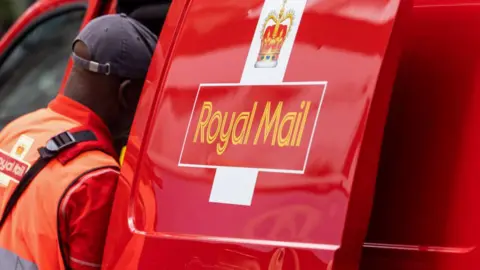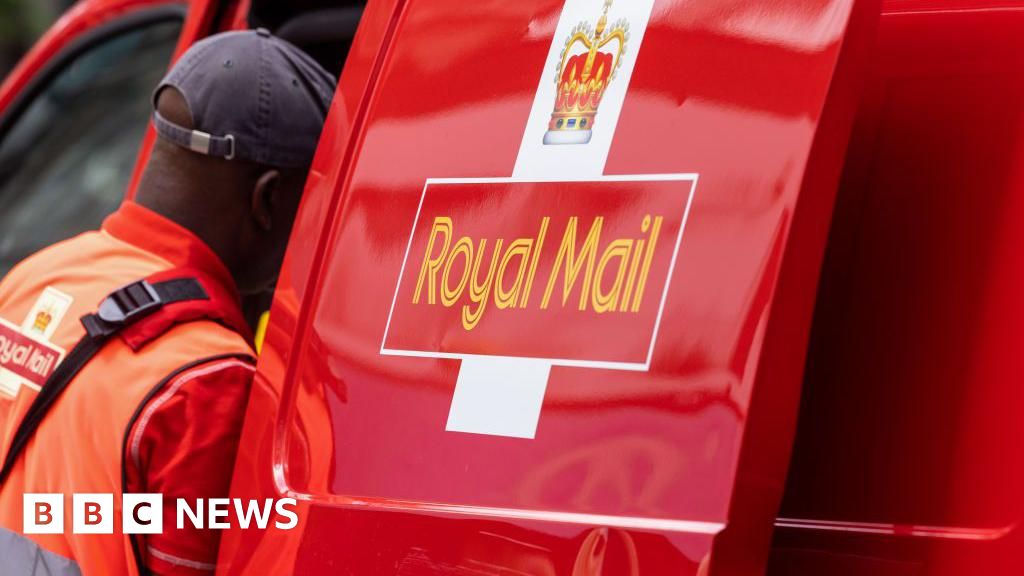Simon Jack,Dearbail Jordan
 Getty Images
Getty ImagesThe board of the company that owns Royal Mail is expected to recommend a fresh takeover offer for the 500-year-old organisation on Wednesday.
Czech billionaire Daniel Kretinsky will firm up an offer of £5bn, including assumed debts, for the company which employs more than 150,000 people.
It’s thought the offer will include commitments to retain the name, brand, UK headquarters and UK tax residency, as well as ruling out compulsory redundancies.
Business Secretary Kemi Badenoch, who has yet to meet Mr Kretinsky, has the power under the National Security and Investment Act to scrutinise and potentially block the deal.
Markets seem to think there is a chance the deal will be blocked by the current or any future government as the shares in Royal Mail’s parent company are trading at a 13% discount to the 370p a share being offered by Kretinsky.
However, others point to the fact that the government did not intervene at a time it could have done in 2022 when the entrepreneur raised his stake from 22% to the 27.5% of shares he already owns.
Chancellor Jeremy Hunt has said that any takeover bid for Britain’s Royal Mail would be subject to “normal” national security scrutiny but it would not be opposed in principle.
Shadow business secretary Jonathan Reynolds wrote to Mr Kretinsky two weeks ago to stress the historic and crucial role that Royal Mail played in the life and economy of the UK, spelling out undertakings that Mr Kretinsky’s offer is expected to entail.
BBC News has seen Mr Kretinsky’s response to Mr Reynolds’ letter, in which he wrote that the postal firm will remain headquartered and tax resident in the UK, that it will recognise workers’ unions, and that Royal Mail will continue to be the Universal Service Provider.
“We believe that if accepted by IDS [International Distributions Services, parent company of Royal Mail] shareholders, our offer will provide Royal Mail with an opportunity to secure its financial future,” Mr Kretinsky wrote.
Royal Mail, which was split from the Post Office and privatized a decade ago, is legally obliged to deliver a one-price-goes-anywhere “universal service”, which means it has to deliver letters six days per week, Monday to Saturday, and parcels Monday to Friday.
But the company’s performance in recent years has deteriorated, leading to heavy financial losses, with customers regularly not receiving letters, including important medical appointments and legal documents, on time.
Parent company International Distribution Services made a small profit last year which was entirely generated by its German and Canadian logistics and parcels business, off-setting losses at Royal Mail.
The volume of letters being posted has plummeted, with half the number being sent compared to 2011 levels. Meanwhile, parcel deliveries have become more popular – and more profitable.
The universal service obligation is under review, with Royal Mail suggesting to Ofcom that reducing second class deliveries to every other weekday would save up to £300m a year and give the business “a fighting chance”.
Dave Ward, general secretary of the Communication Workers Union (CWU) which represents postal workers said: “This situation is a direct result of a failed and ideological privatisation… mixed with the blatant mismanagement of the company in recent years.”
“These events have ripened one of the most iconic and important companies in the UK for a takeover by foreign investors,” he added.
Mr Ward did say that he welcomed some of the commitments put forward so far, “but the reality is postal workers across the UK have lost all faith in the senior management of Royal Mail and the service has been deliberately run down.”
The union will meet with Mr Kretinsy’s EP Group next week, calling for a “complete reset” in employee and industrial relations, as well as further commitments on the future of the company.
It will also be directly engaging with Labour and others to call for a new model of ownership for Royal Mail, where it hopes its members would have a “direct say in key decisions”.
The entrepreneur Daniel Kretinsky made his fortune in the energy industry but has in recent years diversified his interests into retail and logistics. He owns 10% of Sainsbury’s and 25% of West Ham football club.
The BBC understands that the Department of Business and Trade would expect any bidder for the Royal Mail Group to engage with ministers.
International Distribution Services declined to comment.
The Czech and the mail: Who is Daniel Křetínský?
 Reuters
ReutersDaniel Křetínský, the would-be owner of the Royal Mail, has all the trappings of the modern day billionaire.
The 48-year old Czech businessman and lawyer is worth a cool £6bn, according to the Sunday Times Rich List.
He owns fancy houses in upmarket areas.
These include Heath Hall on London’s Bishop Avenue – aka billionaire’s row – which he bought for £65m and once rented to popstar Justin Bieber for a reputed £25,000 a week.
He also spent €21.5m (£18.3m) buying a Parisian townhouse down the road from the Elysee Palace from Russian oligarch and fertilizer magnate Dmitry Rybolovlev and his ex-wife.
Mr Křetínský also owns a share of the Velaa private island resort in the Maldives.
And, like others in his wealth bracket, he has a football club or two. These include AC Sparta Prague, as well as Britain’s own West Ham in which he holds a 27% stake.
Apparently known as the “quiet sphinx” for his inscrutable style, what is known about Mr Křetínský is that he made his money in Central and Eastern European energy via a labyrinthine structure of companies.
This includes Eustream which transports Russian gas via pipelines that run through Ukraine, the Czech Republic and Slovakia.
In the UK, Mr Křetínský has built up quite a portfolio in well-known brands through Vesa Equity Investment, a private firm which is registered in Luxembourg.
These include sizeable stakes in supermarket group Sainsbury’s and the sportswear retailer Footlocker – as well as International Distribution Services, the parent company of Royal Mail.


